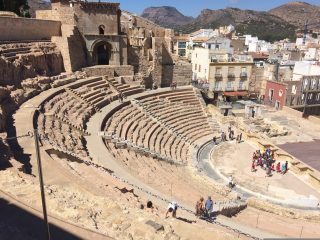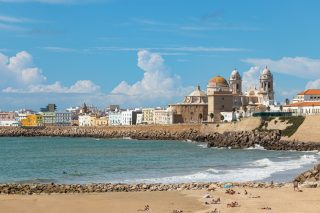Greece: The Ultimate Travel Guide 2026

Greece, located in southeastern Europe, is a destination that seamlessly blends ancient wonders with breathtaking landscapes. Visitors can explore the iconic Acropolis in Athens, where the Parthenon stands as a testament to classical architecture. The capital city offers a vibrant mix of historical sites, bustling markets, and modern cafes, making it an ideal starting point for any Greek adventure. Beyond Athens, the Peloponnese region boasts stunning coastal views, ancient ruins like Olympia, and charming villages that provide a glimpse into traditional Greek life.
The Greek islands are a highlight for travelers, each offering a unique experience. Santorini, with its whitewashed buildings and volcanic beaches, is perfect for romantic getaways, while Mykonos is known for its lively nightlife and cosmopolitan atmosphere. Crete, the largest island, features diverse landscapes, from rugged mountains to pristine beaches, along with a rich culinary tradition. The Ionian Islands, including Corfu and Zakynthos, provide lush greenery and crystal-clear waters, ideal for relaxation and exploration.
For those seeking cultural immersion, Greece hosts numerous festivals and events throughout the year. The Athens Epidaurus Festival showcases world-class performances in ancient theaters, while local celebrations in villages bring traditional music, dance, and cuisine to life. Whether exploring historical landmarks, indulging in Mediterranean flavors, or soaking up the sun on a secluded beach, Greece offers an unforgettable travel experience that caters to every interest.
Table of Contents
- History of Greece
- Best Time to Visit Greece
- Food and Drink from Greece
- 1. Moussaka – Layered Eggplant Casserole
- 2. Tomatokeftedes – Santorini Tomato Fritters
- 3. Fava – Santorini Yellow Split Pea Purée
- 4. Bougatsa – Custard-Filled Pastry
- 5. Saganaki – Fried Cheese
- 6. Ouzo – Anise-Flavored Spirit
- 7. Retsina – Pine-Resin Wine
- 8. Tsipouro – Strong Grape Brandy
- 9. Loukoumades – Greek Honey Doughnuts
- 10. Halva – Semolina-Based Sweet
History of Greece
Greece: Prehistoric and Bronze Age Civilizations (7000–1100 BC)
Greece’s earliest settlements date back to the Neolithic period, with agricultural communities forming around 7000 BC. The Bronze Age saw the rise of the Minoan civilization on Crete (c. 3000–1100 BC), known for its advanced architecture and maritime trade. The Mycenaean civilization (c. 1600–1100 BC) followed, dominating mainland Greece with fortified palaces and a warrior culture. The collapse of Mycenaean society led to the Greek Dark Ages.
Greece: The Archaic and Classical Periods (800–323 BC)
The Archaic period (800–500 BC) marked the emergence of city-states (poleis) like Athens and Sparta, each developing distinct political systems. The Classical period (500–323 BC) saw Greece flourish in philosophy, art, and democracy, particularly in Athens under Pericles. The Persian Wars (499–449 BC) united Greek states against external threats, while the Peloponnesian War (431–404 BC) weakened Athens and Sparta. The era ended with the rise of Alexander the Great, who expanded Greek influence across Asia and Egypt.
Greece: The Hellenistic and Roman Periods (323 BC–330 AD)
Following Alexander’s death in 323 BC, Greece entered the Hellenistic period, characterized by cultural diffusion and scientific advancements. Greek territories eventually fell under Roman control in 146 BC, integrating into the Roman Empire while maintaining Greek traditions. Athens remained a center of learning, influencing Roman philosophy and governance.
Greece: Byzantine and Ottoman Rule (330–1821)
With the establishment of the Byzantine Empire in 330 AD, Greece became a vital part of Eastern Orthodox Christianity. Byzantine rule lasted until the Fourth Crusade (1204), which fragmented Greek territories. By the 15th century, Greece was under Ottoman control, enduring centuries of foreign rule while preserving its cultural identity.
Greece: Independence and Modern Nationhood (1821–Present)
The Greek War of Independence (1821–1829) led to the establishment of a sovereign Greek state. Throughout the 19th and 20th centuries, Greece expanded its territory and navigated political challenges, including World War II and a military junta (1967–1974). Today, Greece is a democratic nation known for its historical legacy, tourism, and Mediterranean lifestyle.
Best Time to Visit Greece
Greece: Spring (March–May)
Spring is an excellent time to visit Greece, with mild temperatures and blooming landscapes. The Greek Orthodox Easter celebrations in April bring vibrant festivities, including traditional feasts and candlelit processions. The countryside is lush, making it ideal for exploring archaeological sites without the summer crowds.
Greece: Summer (June–August) (Best)
Summer is peak season, offering warm weather and lively events. The Athens Epidaurus Festival showcases world-class performances in ancient theaters, while the Santorini Jazz Festival adds a cultural touch to island life. The Greek islands are at their most vibrant, with crystal-clear waters perfect for swimming and sailing.
Greece: Autumn (September–November)
Autumn is a great time for wine lovers, as harvest festivals take place across Greece, particularly in Crete and the Peloponnese. The Athens Marathon in November attracts runners from around the world, while the cooler temperatures make sightseeing more comfortable. The crowds begin to thin, offering a more relaxed experience.
Greece: Winter (December–February)
Winter in Greece is quieter, with fewer tourists and a more local feel. The Christmas markets in Athens and Thessaloniki bring festive charm, while ski resorts in northern Greece offer winter sports opportunities. It’s a great time to explore historical sites without the summer rush.
Food and Drink from Greece
1. Moussaka – Layered Eggplant Casserole
Moussaka is one of Greece’s most iconic dishes, featuring layers of eggplant, minced meat, and a rich béchamel sauce. This hearty meal is baked to perfection, offering a creamy texture and deep flavors.
2. Tomatokeftedes – Santorini Tomato Fritters
These crispy fritters are made from Santorini’s unique volcanic tomatoes, which are small, sweet, and intensely flavorful. The dish is a local specialty, combining herbs and spices for a delicious bite.
3. Fava – Santorini Yellow Split Pea Purée
A staple of Greek cuisine, Fava is a smooth purée made from yellow split peas, often topped with olive oil, onions, and capers. It’s a simple yet flavorful dish that pairs well with fresh bread.
4. Bougatsa – Custard-Filled Pastry
Bougatsa is a flaky phyllo pastry filled with creamy custard and dusted with powdered sugar and cinnamon. It’s a popular breakfast or dessert, offering a delightful contrast of textures.
5. Saganaki – Fried Cheese
Saganaki is a pan-fried cheese dish, typically made with hard Greek cheeses like Kefalotyri or Graviera. It’s served sizzling hot, often with a squeeze of lemon for added zest.
6. Ouzo – Anise-Flavored Spirit
Ouzo is Greece’s signature alcoholic drink, known for its strong anise flavor. It’s traditionally served with water or ice, turning cloudy as it dilutes, and is often enjoyed alongside meze dishes.
7. Retsina – Pine-Resin Wine
Retsina is a unique Greek wine infused with pine resin, giving it a distinct herbal aroma. This ancient winemaking tradition dates back thousands of years and remains a favorite among locals.
8. Tsipouro – Strong Grape Brandy
Tsipouro is a potent Greek spirit distilled from grape pomace. It’s similar to Italian grappa and is often enjoyed as an aperitif or after a meal.
9. Loukoumades – Greek Honey Doughnuts
Loukoumades are small, deep-fried dough balls drizzled with honey and sprinkled with cinnamon or crushed nuts. They are a beloved Greek dessert, crispy on the outside and soft inside.
10. Halva – Semolina-Based Sweet
Halva is a dense, sweet confection made from semolina, sugar, and nuts. It has a rich, nutty flavor and is often served as a dessert or a fasting-friendly treat.











